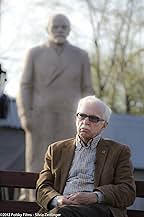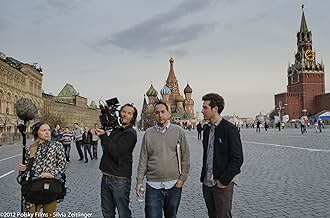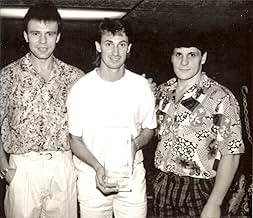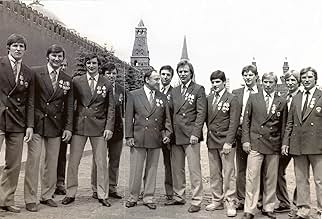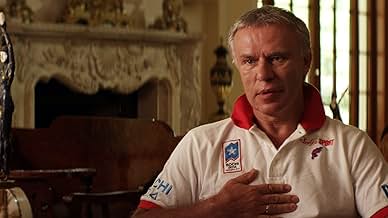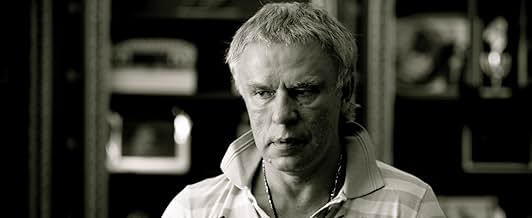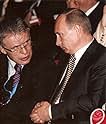VALUTAZIONE IMDb
7,6/10
7355
LA TUA VALUTAZIONE
Aggiungi una trama nella tua linguaThe story of the Soviet Union's famed Red Army hockey team through the eyes of its players.The story of the Soviet Union's famed Red Army hockey team through the eyes of its players.The story of the Soviet Union's famed Red Army hockey team through the eyes of its players.
- Premi
- 5 vittorie e 11 candidature totali
Viacheslav Fetisov
- Self
- (as Slava Fetisov)
Herb Brooks
- Self - US Olympic Coach
- (filmato d'archivio)
- (voce)
Don Cherry
- Self - Hockey Commentator
- (filmato d'archivio)
- (voce)
Recensioni in evidenza
Greetings again from the darkness. You need not be a hockey fan to be familiar with the "Miracle on Ice" upset of the seasoned Russians by the upstart Americans at the 1980 Olympics in Lake Placid. Often referred to as a battle of cultures – "our way vs their way, capitalism vs communism" – most articles, TV shows, and movies have been presented from the American perspective. It's only now, in this informative and entertaining documentary from filmmaker Gabe Polsky, that we gain some insight into the Russian players and their way of life.
Mr. Polsky is the son of Russian immigrants, and grew up playing hockey in Chicago and later for Yale. His research into Russian hockey evolved into a documentary that blends sports, geopolitics, history, culture, and personal stories. He mixes in some fantastic archival film footage from the 1970's and 80's, but the heart of everything here flows from the interviews with Russian hockey legend Vyacheslav Fetisov, who is a vital and unique link to past and present.
Fetisov is sometimes playful and sometimes snide in his remarks, but he basically narrates the history of Russian hockey – starting with Stalin's founding of the organization, through the two key coaches: father figure Tarasov and the militant Tikhanov who followed. Stalin was convinced that Russian domination of global sports would clearly establish communism and the Russian culture as far superior to capitalism and the carefree ways of the west. This led to the Red Army hockey camps being run by the military. The players were isolated for eleven months each year, training and playing in a manner that generated ultimate teamwork, but also quite unhappy young men.
We see the influence of Russian chess (Karpov) and the Bolshoi ballet for training methods, and we also see the ever-present KGB ensuring no "escapes", or what we might know better as defections. We learn about the Russian Five (including Fetisov) who were so dominant that the team went two years without losing. Gold medals in Sarajevo (1984) and Calgary (1988) occurred just prior to the 1991 dissolution of the U.S.S.R. and the economic crisis of the region.
This is what opened the door for Russian hockey players to enter the NHL, though the transition was smoother for some than others. After a few years of adjusting, it was coach Scotty Bowman's 1997 Detroit Red Wings that won the Stanley Cup with a contingency of Russian players (including Fetisov) who were given free reign to play their own game while on the ice. Their movements and intricate teamwork clashed mightily with the individualistic style of westerners and that group of Russian players can be credited with helping the game to evolve to its current style.
Much of the insight comes from the faces of the men who are interviewed. Their stoicism and lack of emotion is a microcosm of the society in which they were raised. Their country was obliterated by war, and then led by a megalomaniac who wanted to rule the world. Human emotion and the rights of individuals mattered little, and we see that despite the years of hardship, these players remain (mostly) true and loyal to their country. This is a fascinating look at human nature and how the culture of one's youth can directly impact the beliefs as an adult, so many years later.
Mr. Polsky is the son of Russian immigrants, and grew up playing hockey in Chicago and later for Yale. His research into Russian hockey evolved into a documentary that blends sports, geopolitics, history, culture, and personal stories. He mixes in some fantastic archival film footage from the 1970's and 80's, but the heart of everything here flows from the interviews with Russian hockey legend Vyacheslav Fetisov, who is a vital and unique link to past and present.
Fetisov is sometimes playful and sometimes snide in his remarks, but he basically narrates the history of Russian hockey – starting with Stalin's founding of the organization, through the two key coaches: father figure Tarasov and the militant Tikhanov who followed. Stalin was convinced that Russian domination of global sports would clearly establish communism and the Russian culture as far superior to capitalism and the carefree ways of the west. This led to the Red Army hockey camps being run by the military. The players were isolated for eleven months each year, training and playing in a manner that generated ultimate teamwork, but also quite unhappy young men.
We see the influence of Russian chess (Karpov) and the Bolshoi ballet for training methods, and we also see the ever-present KGB ensuring no "escapes", or what we might know better as defections. We learn about the Russian Five (including Fetisov) who were so dominant that the team went two years without losing. Gold medals in Sarajevo (1984) and Calgary (1988) occurred just prior to the 1991 dissolution of the U.S.S.R. and the economic crisis of the region.
This is what opened the door for Russian hockey players to enter the NHL, though the transition was smoother for some than others. After a few years of adjusting, it was coach Scotty Bowman's 1997 Detroit Red Wings that won the Stanley Cup with a contingency of Russian players (including Fetisov) who were given free reign to play their own game while on the ice. Their movements and intricate teamwork clashed mightily with the individualistic style of westerners and that group of Russian players can be credited with helping the game to evolve to its current style.
Much of the insight comes from the faces of the men who are interviewed. Their stoicism and lack of emotion is a microcosm of the society in which they were raised. Their country was obliterated by war, and then led by a megalomaniac who wanted to rule the world. Human emotion and the rights of individuals mattered little, and we see that despite the years of hardship, these players remain (mostly) true and loyal to their country. This is a fascinating look at human nature and how the culture of one's youth can directly impact the beliefs as an adult, so many years later.
I came away from this movie deep in thought, trying to piece together the personal journeys of the cast, the context of life in the USSR, the changes and resulting impact upon the players lives.
This documentary is well researched and highly viewable, it is not just a male only film.
Women get to see stripped to the bare bone, deep male team bonding, open responses to complex relationships and real meaning as to how 5 men dominated a sport in the USSR and the Americas.
The death of one of the cast members shortly after the movie added a melancholy touches, yet there is humour from both Gabe Polsky and Vyacheslav Fetisov.
It was clever, I see this documentary staying around for some time, certainly one to watch again.
This documentary is well researched and highly viewable, it is not just a male only film.
Women get to see stripped to the bare bone, deep male team bonding, open responses to complex relationships and real meaning as to how 5 men dominated a sport in the USSR and the Americas.
The death of one of the cast members shortly after the movie added a melancholy touches, yet there is humour from both Gabe Polsky and Vyacheslav Fetisov.
It was clever, I see this documentary staying around for some time, certainly one to watch again.
"Do you believe in miracles?! YES!!" That was sportscaster Al Michaels' immortal exaltation at the end of the 1980 Olympic hockey game which became known as "The Miracle on Ice". An American team of amateur and college hockey players had defeated the vaunted team from the Soviet Union, which had won the gold medal in the last four Winter Olympics and six of the last seven. The U.S. team would go on to win the gold medal by defeating Finland. The highly improbable American victory over the Russians was named by Sports Illustrated as the greatest sports moment of the 20th century and spawned a TV movie, a documentary film and the 2004 feature "Miracle" starring Kurt Russell. But what of the Soviet team? How did this shocking loss affect them? And was this the beginning of the end for Russian dominance of international ice hockey? The documentary "Red Army" (PG, 1:25) answers those questions and many more as it delves into the stories of the men behind the hockey masks and the dramatic history of their national sport.
The story of the Soviet Red Army hockey program is one of athletic, social, political and military influences that reflected the larger phenomenon of the Cold War and dictated the fates of those involved. This film contains the kind of interviews that you'd expect from such a documentary and also uses little-seen archival footage, creative modern graphics and skilled editing to tell this story in a very engaging way. The main interviewee is Soviet team captain Viacheslav Fetisov who describes his story as it felt back then and apparently still feels today. Interviews with his wife, his former teammates, a former KGB agent and a few journalists tell of their experiences and give valuable color commentary, but just as revealing is what is NOT said in the documentary. Co-producer, director, writer and interviewer Gabe Polsky is smart enough to turn the camera on early, keep it rolling and edit into the film the honesty and emotion that shows itself in the candid moments and unguarded reactions of his interviewees.
The film's scope covers over four decades of the Soviet Union's hockey program, but focuses mainly on the 1980s, a decade which began with Cold War tensions heightened by the Soviet invasion of Afghanistan and ended with the rapid decline of the USSR as a unified state. During this period, Fetisov and his teammates absorbed that crushing Olympic defeat, dealt with the changes that followed, rose to new challenges and, eventually, began to consider careers in the NHL, as the Soviet government gradually loosened its strong grip on its players, just as it began losing control of its people and its empire. Polsky uses all the tools at his disposal to illustrate how the Russians ran their program and what that program meant to the country. We see children from all over their massive and diverse nation training, playing and competing within the program. We observe "the best of the best of the best", as one interviewee describes them, transition from hockey players to Russian icons, and cogs in the Soviet Union's propaganda machine. We learn that these elite players were to place hockey above literally everything else in their lives. We come to understand that their purpose was to embody the superiority of their communist system. We get to peek behind the Iron Curtain and contemplate an untold story unlike any other in sports.
"Red Army" doesn't just reveal the untold story of the Soviet Union's ice hockey program, but helps us see that the men involved were more than their government's propaganda puppets, but were human beings with desires for their lives, both common and uncommon problems, and impressive amounts of talent and work ethic. This is a documentary that feels like a drama. The film brings openness to a notoriously closed system and tells a story that most audience members have never thought about, but will be unable to avoid thinking about after seeing this movie. The only weak spot I noticed was the soundbites of the director's amateurish interviewing techniques. That aside, this is a fascinating film which raises the bar for future documentaries of its kind. "A-"
The story of the Soviet Red Army hockey program is one of athletic, social, political and military influences that reflected the larger phenomenon of the Cold War and dictated the fates of those involved. This film contains the kind of interviews that you'd expect from such a documentary and also uses little-seen archival footage, creative modern graphics and skilled editing to tell this story in a very engaging way. The main interviewee is Soviet team captain Viacheslav Fetisov who describes his story as it felt back then and apparently still feels today. Interviews with his wife, his former teammates, a former KGB agent and a few journalists tell of their experiences and give valuable color commentary, but just as revealing is what is NOT said in the documentary. Co-producer, director, writer and interviewer Gabe Polsky is smart enough to turn the camera on early, keep it rolling and edit into the film the honesty and emotion that shows itself in the candid moments and unguarded reactions of his interviewees.
The film's scope covers over four decades of the Soviet Union's hockey program, but focuses mainly on the 1980s, a decade which began with Cold War tensions heightened by the Soviet invasion of Afghanistan and ended with the rapid decline of the USSR as a unified state. During this period, Fetisov and his teammates absorbed that crushing Olympic defeat, dealt with the changes that followed, rose to new challenges and, eventually, began to consider careers in the NHL, as the Soviet government gradually loosened its strong grip on its players, just as it began losing control of its people and its empire. Polsky uses all the tools at his disposal to illustrate how the Russians ran their program and what that program meant to the country. We see children from all over their massive and diverse nation training, playing and competing within the program. We observe "the best of the best of the best", as one interviewee describes them, transition from hockey players to Russian icons, and cogs in the Soviet Union's propaganda machine. We learn that these elite players were to place hockey above literally everything else in their lives. We come to understand that their purpose was to embody the superiority of their communist system. We get to peek behind the Iron Curtain and contemplate an untold story unlike any other in sports.
"Red Army" doesn't just reveal the untold story of the Soviet Union's ice hockey program, but helps us see that the men involved were more than their government's propaganda puppets, but were human beings with desires for their lives, both common and uncommon problems, and impressive amounts of talent and work ethic. This is a documentary that feels like a drama. The film brings openness to a notoriously closed system and tells a story that most audience members have never thought about, but will be unable to avoid thinking about after seeing this movie. The only weak spot I noticed was the soundbites of the director's amateurish interviewing techniques. That aside, this is a fascinating film which raises the bar for future documentaries of its kind. "A-"
There has never been such beauty in sport than ice hockey performed by the Soviet Union at its best. How was it possible? It's pretty obvious that it all was due to propaganda reasons. The Communist human was superior, according to Soviet leaders. Or at least they wanted to think so; but the almost only way to prove it was through the athletes.
The legendary Fetisov tells most of the story here. How the players were kept almost as slaves under the regime of KGB man Tichonov. And when finally the Soviet system broke down, Fetisov and his comrades were allowed to play in NHL. But had to give most of their money to the embassy.
A sometimes breathtaking documentary and the system succeeded in creating some of the best athletes ever. And yes, they impressed the West. But the price was high.
The legendary Fetisov tells most of the story here. How the players were kept almost as slaves under the regime of KGB man Tichonov. And when finally the Soviet system broke down, Fetisov and his comrades were allowed to play in NHL. But had to give most of their money to the embassy.
A sometimes breathtaking documentary and the system succeeded in creating some of the best athletes ever. And yes, they impressed the West. But the price was high.
Director Gabe Polsky uses his debut documentary Red Army to explore perhaps one of the most intriguing stories of hockey that has ostensibly swept under the rug in the modern day. Polsky tells the story of the Soviet Union's hockey team during the Cold War. He uses the captain of the Soviet's hockey team known as HC CSKA Moscow Viacheslav "Slava" Fetisov to paint the picture of an unstoppable hockey team that practiced ruthlessly and was kept under less than adequate conditions by their dictator of a coach.
Right of the bat, Fetisov is a cantankerous presence, thoroughly unpleasant to the audience and Polsky, going as far as to flip off Polsky whilst he plays on his phone in the middle of an interview. However, Fetisov finally gets the intriguing story out of him that we came for. He tells of a time when the Soviet Union selected hockey as the country's sport and how numerous young children would stand in line for hours on end to try out for the Soviet teams. The USSR was about unity and people saw hockey as a way to unite everyone through the spirit of a team and the desire to win at all costs.
The HC CSKA Moscow, better known by their name of the "Red Army," was a meticulously coached and organized team. Archival footage showing practices and actual games show a team hellbent on executing strategy, with slick, blink-and-you-miss-it puck passing amongst players, even in the tightest situations. One of Polsky's angles in the film is how there is a contrast between American hockey and Soviet hockey and that contrast is evident just by looking at a few clips of the Red Army in action. Where the Red Army was concerned with maintaining puck possession in the toughest situations, American hockey finds itself often preoccupied with checking and fighting.
The Red Army was coached by Viktor Tikhonov, the aforementioned ruthless coach. No player featured in Red Army has a particularly kind word to spare for Tikhonov, all of whom reflecting on some of his most frighteningly strict and demeaning moments. One player recalls how he wouldn't let a teammate visit his dying father back home, and another reflects on how players urinated blood because Tikhonov worked them so hard. Tikhonov believed in a dictatorship when it came to coaching hockey; he was also worried about players defecting or abandoning allegiance to the USSR in favor of playing for the NHL. If Tikhonov thought one of his players was planning to jump ship, no matter how skilled they were, he would cut them and blacklist them from hockey, all but guaranteeing they'd never get an opportunity to play in the NHL.
Those who did get the fortunate opportunity to play in the NHL, thanks to their unbelievable talent and skill, like Fetisov, a nineteen-year-old rookie named Alexandr Mogilny, and the talented center Sergei Fedorov, found themselves under an unrealistic amount of scrutiny for their decision. Fetisov, in particular, had to jump through a series of hoops in order to land the spot on the roster of the New Jersey Devils. Devils' manager Lou Lamoriello had granted an immense signing bonus to Fetisov but the Soviet Union refused to give up one of their most dynamic players. The Soviets saw players jumping ship for the NHL as a victory for the west and a grand loss for the USSR.
Red Army does a fine job at exposing the blurred line of sports and politics, showing how during the Cold War era, the two worked in conjunction with one another quite brazenly. Polsky works to keep this documentary on topic, although in only eighty-four minutes, and admittedly a great deal of ground to cover and characters to profile, it's difficult for Polsky to hit all his targets with complete development. It almost feels like this runtime was set before the documentary even began filming and he was prohibited from going over by even a minute. Still, this is a hearty documentary that houses a great deal of personality in its depictions of contrasting views and politics of the same sport and how politics itself got involved in a sport and resulted in a messy ordeal for many involved.
Directed by: Gabe Polsky.
Right of the bat, Fetisov is a cantankerous presence, thoroughly unpleasant to the audience and Polsky, going as far as to flip off Polsky whilst he plays on his phone in the middle of an interview. However, Fetisov finally gets the intriguing story out of him that we came for. He tells of a time when the Soviet Union selected hockey as the country's sport and how numerous young children would stand in line for hours on end to try out for the Soviet teams. The USSR was about unity and people saw hockey as a way to unite everyone through the spirit of a team and the desire to win at all costs.
The HC CSKA Moscow, better known by their name of the "Red Army," was a meticulously coached and organized team. Archival footage showing practices and actual games show a team hellbent on executing strategy, with slick, blink-and-you-miss-it puck passing amongst players, even in the tightest situations. One of Polsky's angles in the film is how there is a contrast between American hockey and Soviet hockey and that contrast is evident just by looking at a few clips of the Red Army in action. Where the Red Army was concerned with maintaining puck possession in the toughest situations, American hockey finds itself often preoccupied with checking and fighting.
The Red Army was coached by Viktor Tikhonov, the aforementioned ruthless coach. No player featured in Red Army has a particularly kind word to spare for Tikhonov, all of whom reflecting on some of his most frighteningly strict and demeaning moments. One player recalls how he wouldn't let a teammate visit his dying father back home, and another reflects on how players urinated blood because Tikhonov worked them so hard. Tikhonov believed in a dictatorship when it came to coaching hockey; he was also worried about players defecting or abandoning allegiance to the USSR in favor of playing for the NHL. If Tikhonov thought one of his players was planning to jump ship, no matter how skilled they were, he would cut them and blacklist them from hockey, all but guaranteeing they'd never get an opportunity to play in the NHL.
Those who did get the fortunate opportunity to play in the NHL, thanks to their unbelievable talent and skill, like Fetisov, a nineteen-year-old rookie named Alexandr Mogilny, and the talented center Sergei Fedorov, found themselves under an unrealistic amount of scrutiny for their decision. Fetisov, in particular, had to jump through a series of hoops in order to land the spot on the roster of the New Jersey Devils. Devils' manager Lou Lamoriello had granted an immense signing bonus to Fetisov but the Soviet Union refused to give up one of their most dynamic players. The Soviets saw players jumping ship for the NHL as a victory for the west and a grand loss for the USSR.
Red Army does a fine job at exposing the blurred line of sports and politics, showing how during the Cold War era, the two worked in conjunction with one another quite brazenly. Polsky works to keep this documentary on topic, although in only eighty-four minutes, and admittedly a great deal of ground to cover and characters to profile, it's difficult for Polsky to hit all his targets with complete development. It almost feels like this runtime was set before the documentary even began filming and he was prohibited from going over by even a minute. Still, this is a hearty documentary that houses a great deal of personality in its depictions of contrasting views and politics of the same sport and how politics itself got involved in a sport and resulted in a messy ordeal for many involved.
Directed by: Gabe Polsky.
Lo sapevi?
- Citazioni
(voice): [confused] Wait a second. Go Back. I don't get why Yazov let you leave the country, if he was mad at you.
Viacheslav Fetisov: I'm not a historian. My feeling was the country tried to change something, because it's Perestroika time, but he doesn't want changes. Everybody was afraid. It's understandable. It's like in a dark room, trying to find a dark cat. It's not funny.
[still confused]
(voice): Okay.
- ConnessioniFeatured in Docventures: Urheilu (2015)
I più visti
Accedi per valutare e creare un elenco di titoli salvati per ottenere consigli personalizzati
- How long is Red Army?Powered by Alexa
Dettagli
- Data di uscita
- Paesi di origine
- Sito ufficiale
- Lingue
- Celebre anche come
- Красная армия
- Azienda produttrice
- Vedi altri crediti dell’azienda su IMDbPro
Botteghino
- Lordo Stati Uniti e Canada
- 694.600 USD
- Fine settimana di apertura Stati Uniti e Canada
- 20.100 USD
- 25 gen 2015
- Lordo in tutto il mondo
- 798.680 USD
- Tempo di esecuzione
- 1h 24min(84 min)
- Colore
- Proporzioni
- 1.85 : 1
Contribuisci a questa pagina
Suggerisci una modifica o aggiungi i contenuti mancanti







